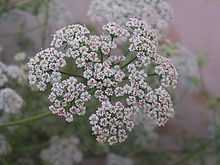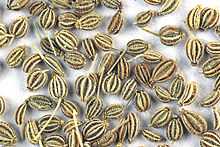Ajwain
| Ajwain | |
|---|---|
 | |
| Flowers of Trachyspermum ammi | |
| Scientific classification | |
| Kingdom: | Plantae |
| (unranked): | Angiosperms |
| (unranked): | Eudicots |
| (unranked): | Asterids |
| Order: | Apiales |
| Family: | Apiaceae |
| Genus: | Trachyspermum |
| Species: | T. ammi |
| Binomial name | |
| Trachyspermum ammi Sprague | |
| Synonyms[1][2] | |
Ajwain, ajowan (/ˈædʒəwɒn/)[3] (Urdu: اجوائن ajwan), or carom, Trachyspermum ammi, is an annual herb in the family Apiaceae. It originated in the eastern Mediterranean, possibly Egypt, and spread up to India from the Near East. Both the leaves and the fruit pods (often mistakenly called seeds) of the plant are consumed by humans. The plant is also called bishop's weed, but this is a common name it shares with some other different plants. The "seed" (i.e., the fruit pod) is often confused with lovage seed.[4]
Description

The small fruit pods are pale brown and have an oval shape, resembling caraway and cumin. It has a bitter and pungent taste, with a flavor similar to anise and oregano. They smell almost exactly like thyme because it also contains thymol, but is more aromatic and less subtle in taste, as well as slightly bitter and pungent. Even a small amount of fruit pods tend to dominate the flavor of a dish.[5]
Cultivation and production
The plant is mainly cultivated in Iran and northern India.[4] Rajasthan produced about 55% of India's total output in 2006.[6]
Culinary uses
The fruit pods are rarely eaten raw; they are commonly dry-roasted or fried in ghee, clarified butter. This allows the spice to develop a more subtle and complex aroma. In Indian cuisine it is often part of a baghaar (Urdu: بگھار), a mixture of spices fried in oil or butter, which is used to flavor lentil dishes. It is considered to be an antiflatulent, a spice which reduces the gaseous effects of beans and other legumes.[4] In Afghanistan the fruit pods are sprinkled over bread and biscuits.[7]
References
- ↑ USDA GRIN entry
- ↑ ITIS entry for Trachyspermum ammi
- ↑ definition of ajowan in Oxford dictionary (British & World English)
- ↑ 4.0 4.1 4.2 Green 2006, p. 116.
- ↑ Green 2006, pp. 116–117.
- ↑ Rajasthan Gov, Commissionerate of Agriculture.
- ↑ Davidson 2014, p. 9.
Sources
- Davidson, Alan (2014). Jaine, Tom, ed. The Oxford Companion to Food (Third edition ed.). Oxford, England: Oxford University Press. ISBN 978-0-19-967733-7.
- Green, Aliza (2006). Field Guide to Herbs & Spices: How to Identify, Select, and Use Virtually Every Seasoning at the Market. Philadelphia, Pennsylvania: Quirk Books. ISBN 978-1-59-474082-4.
External links
- Ajwain from The Encyclopedia of Spices
- Ajwain page from Gernot Katzer's Spice Pages
- Hawrelak, JA; Cattley, T; Myers, SP (2009). "Essential oils in the treatment of intestinal dysbiosis: A preliminary in vitro study". Alternative medicine review : a journal of clinical therapeutic 14 (4): 380–4. PMID 20030464.
Further reading
Hill, Tony. (2004) "Ajwain" in The Contemporary Encyclopedia of Herbs and Spices: Seasonings for the Global Kitchen. Wiley. p. 21-23. ISBN 978-0-471-21423-6.
| ||||||